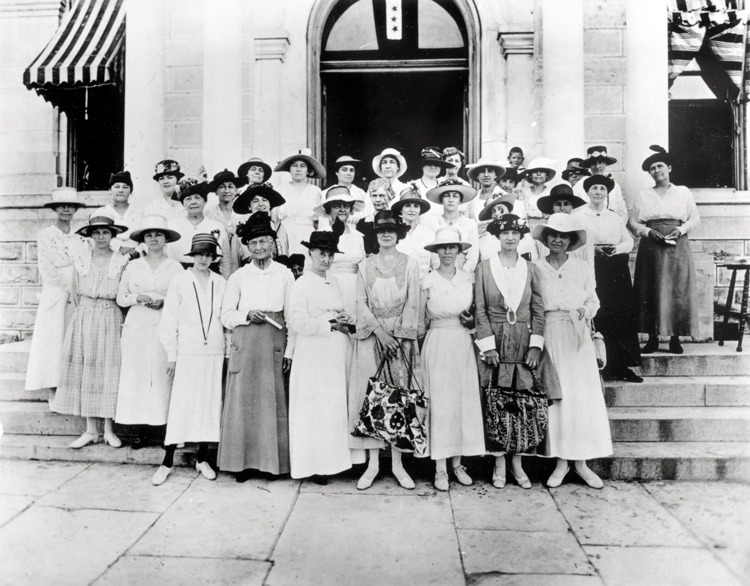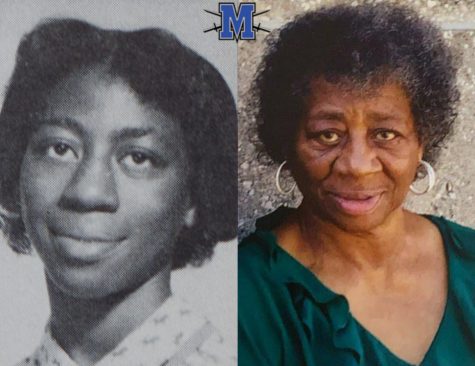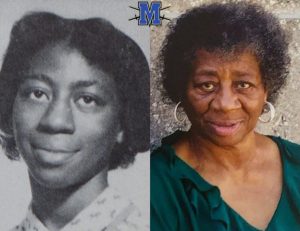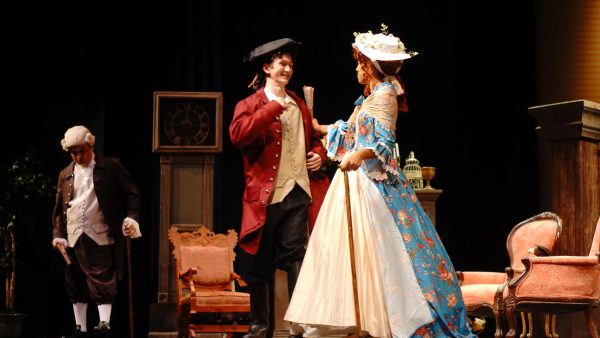THROWBACK THURSDAY: Not your average Jane
While her husband may have made a lasting mark on the Austin school district, Jane McCallum left behind a larger legacy that spanned the entire Lone Star State
Jane McCallum and her fellow suffragettes (PICA 11669). Once the 19th amendment was passed, 5,856 women registered to vote in Travis County nearly the amount of male voters.
March 23, 2023
You probably know that our school is named after A.N. McCallum, but do you have any idea who he is or was? If the answer is no, then you’re not alone. I certainly didn’t before I began writing this article. Born in North Carolina and later studying at the University of Texas, Arthur Newell McCallum was elected superintendent of AISD in 1903. He served for 39 years, during which time the district grew from 12 schools and 4,459 students to 32 schools and 16,128 students. He was known for believing that discrimination had no place in education, which is why he hired the district’s first Hispanic teacher. He was still superintendent when he died in 1943, and McCallum High School was named in his honor in 1953.
[Jane McCallum] would not be defined by social assumptions of her gender and demonstrated through her actions what she was capable of rather than accepting what others thought she could accomplish.
— Rusty Heckaman, Austin History Center reference archivist
It is not too surprising that a public high school would be named in honor of a esteemed superintendent who served the district faithfully for such a long time. What is surprising is that McCallum was not the most distinguished or notable person in his own household. That distinction belongs to his wife, Jane McCallum. She was a prominent suffragist, a political reform activist, a lobbyist, and the Secretary of State for Texas under two governors. She was also a newspaper columnist, the first female jury commissioner for Travis County and the author of several books celebrating the accomplishments of successful Texan women.
Born Jane Yelvington, she was a Texas native who attended Dr. Zealey’s Female College and the University of Texas. Yelvington met McCallum in her hometown of La Vernia, marrying him in 1896. They had four daughters and a son; she was known for her ability to be an active leader involved in many civic issues while still running a full household.
She played a large role in the fight for women’s suffrage as the President of the Austin Women’s Suffrage Association and was an active participant in the Texas Equal Suffrage Association. When the 19th Amendment finally passed, guaranteeing women the right to vote, she served as the state manager of press and publicity for the ratification committee. After the issue she had fought for for nearly a decade was resolved, she wrote, “With high hopes and enthusiasm women stepped forth into a world in which they were CITIZENS AT LAST!”
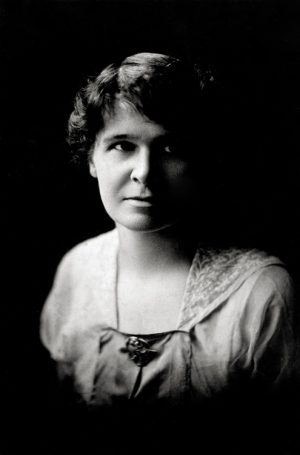
“Mrs. McCallum was a very driven individual,” said Rusty Heckaman, the Reference Archivist at Austin History Center. “She latched onto the issues she was passionate about and exhaustively pursued them. She would not be defined by social assumptions of her gender and demonstrated through her actions what she was capable of rather than accepting what others thought she could accomplish.”
Once suffrage was won, she then worked for political reform. Though she was a member and leader of many different organizations, a particularly notable one was the Women’s Joint Legislative Council. Famously known as the “Petticoat Lobby,” they pushed for education bills, prison reform, stronger prohibition controls, maternal and child health funds, and the eradication of illiteracy and child labor.
“While each individual victory is an accomplishment worth noting, it is the sum of these efforts that may be her greatest accomplishment for the example it provided of leadership and achievement and the voice that she provided for women in the political process,” Heckaman said.
Through the Petticoat Lobby, she fought to have Daniel J. Moody elected governor of Texas. Once he won and subsequently took office, he appointed her as his Secretary of State. She continued to serve under Gov. Ross Sterling until 1933, making her the only person in Texas, male or female, to hold the position under two governors and for more than two terms. One of her favorite accomplishments during this period was her discovery of an original copy of the Texas Declaration of Independence in a vault in the Capitol building, which she later helped to restore and display in the same building.
The importance of the suffrage movement and [Jane McCallum’s] role in it … should all be a piece of the education provided students today.
— Rusty Heckaman
After her term ended, she became a presidential elector and a state Democratic committeewoman, was appointed to the first Austin city planning commission and became Travis County’s first female grand jury commissioner. She was also a skilled writer, contributing a feminist Sunday feature called “Women and Her Ways” to The Austin-American Statesman, writing multiple books such as Women Pioneers and All Texans Were Not Males and publishing profiles of notable women like sculptor Elisabet Ney.
Her personal participation in community organizations included Texas Fine Arts Association, the League of Women Voters, and the Austin Shakespeare Society. She was also the first married woman to join a sorority at UT, the Alpha Delta Pi.
She died on Aug. 14, 1957, outliving her husband by 14 years and leaving behind a long list of accomplishments. Though her husband’s work was closer to the heart of AISD, one must wonder if perhaps she ought to be honored more.
“The suffrage movement was an important piece of American history,” Heckaman said. “Jane’s role in it should not be overlooked. The importance of both, the movement and her role in it, the impact of its accomplishments, and the context in which it was won should all be a piece of the education provided students today.”
This story was originally published in the Shield on April 22, 2016.



